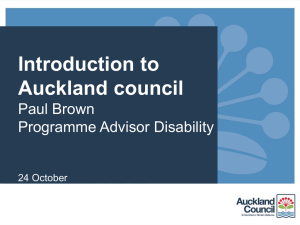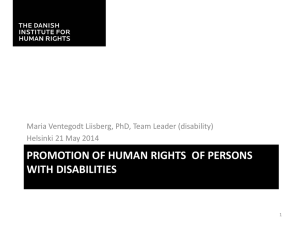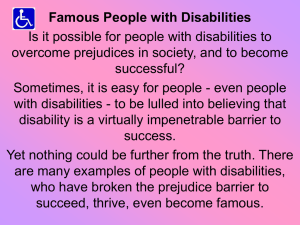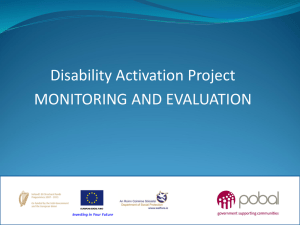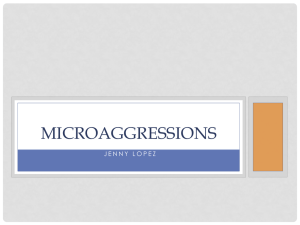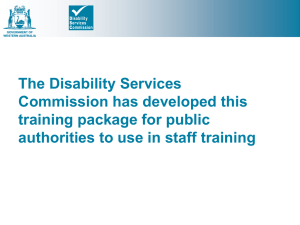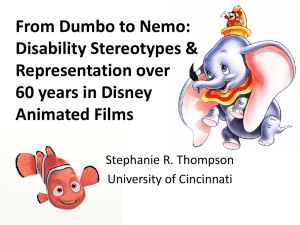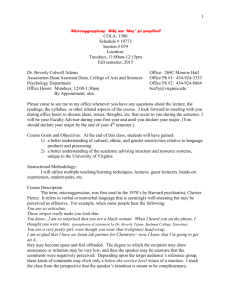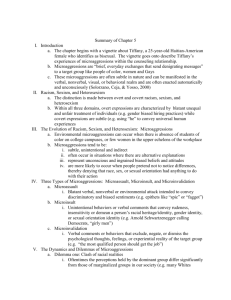AHEAD Bias
advertisement
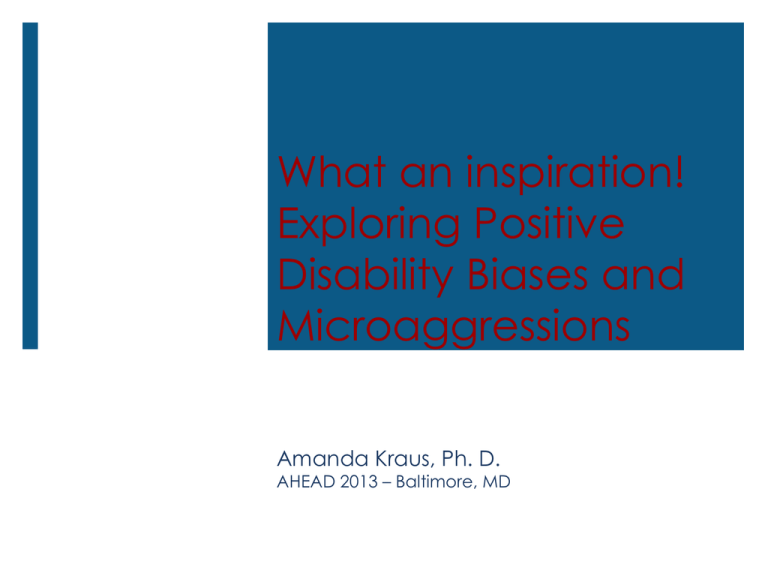
What an inspiration! Exploring Positive Disability Biases and Microaggressions Amanda Kraus, Ph. D. AHEAD 2013 – Baltimore, MD Outline Overview of disability history and prevalent frames Define and explore ableism and non-disability privilege Explore the negative impact of positive biases Identify disability-specific microaggressions Historical Treatment of Disabled People Era 1200 + 1800 + 1930 + 1950 + 1980 + Today? Societal Perspective Possessed by the devil, sinner Genetically defective, inferior Genetically defective polluting the race Treatment Tortured, burned at the stake, left to die Hidden away, freaks, beggars Institutionalized, sterilized, exterminated Unfortunate, objects of charity and pity Independent, selfdetermined Institutionalized, rehabilitated Independent living centers, civil rights, mainstreaming Social justice, Universal Design, growing attention to sports, community, arts Disability as diversity, access is a right, ADA Adams, M. Bell, L.A., & Griffin, P. (Eds.) (1997) Teaching for Diversity and Social Justice: A Sourcebook. New York and London: Routledge. How is disability framed? Frame Core In practice Individual • Locate the problem within the individual • Focus on specific condition/diagnosis • Do not internalize disability as an identity • Cure or fix problem • Disability is negative • Individual accommodations Sociopolitical • Locate problem in environment • Barriers exclude disabled individuals and set parameters of disability experience • Work to identify and eliminate barriers • Disability is neutral • Appreciation for community and culture • Create sustainable change Ableism and Non-Disability Privilege Ableism is a pervasive system of discrimination and exclusion that oppresses people who have cognitive, emotional, and physical [impairments] 3 characteristics of systems organized around privilege: Dominated by privileged groups Identified with privileged groups Centered on privileged groups How do you benefit from your privilege? How do you benefit from your privilege at work? “Positive” Biases Negative: stereotype (N) A widely held, fixed, oversimplified image or idea of a particular type of person or thing Disability people are: Tragic Pitiful Scary bias (N) Prejudice or tendency in favor or against one thing, person or group compared with another, usually considered to be unfair Angry, Chip on their shoulders “Positive”: Disability people are Inspiring In need of help or special attention Never ever give up! Murderball Trailer “This is a lively, life-affirming documentary no viewer is likely to forget.” – Christian Science Monitor “Murderball is a paradox: a movie about quadriplegics that insists we look beyond their disability.” - Boston Globe “Murderball asks you to put all your assumptions about quadriplegics aside and start over.” - Premiere “The film is filled with humor, compassion and cajones, and never once glosses over the fact that these guys are prickly personalities who can sometimes act like jerks. There are also a few tears, but remarkably, not a single one is shed in pity.” – TV Guide Microaggressions Subtle, stunning, often automatic, and nonverbal exchanges, “put downs”, dismissive looks, gestures, tones… So pervasive that they are often overlooked or dismissed as innocuous. Microassaults: Explicit derogations meant to hurt victim (name calling, avoidance, etc.) Microinsults: Words and actions that convey rudeness, insensitivity, demeaning attitudes Microinvalidations: Exclude, negate, dismiss thoughts, feelings or experiences Disability themes Denial of identity Inspiration Disability as a choice Access as a privilege Avoidance Denial of privacy Patronization/Infantilizatio n Spread effect Second class citizen/Burden Desexualization Microaggression Theme A blind man reports that people often raise their voices when speaking to him. Spread effect A person with depression finds it frustrating when people tell her it’s “mind over matter.” Denial of identity/Choice A person with scars on his face and body is regularly asked by strangers, “What happened to you?” Denial of privacy Message/Impact Microaggression Theme A blind student speaks reminds her professor to email her class notes. The professor responds with, “Ugh, I keep forgetting. Can’t you work with a classmate?” Second-class citizen, burden A wheelchairuser opens and pushes through a door. Someone says “Wow, you’re so good with that thing.” Patronization/Hel plessness Message/Impact Microaggression Someone asks a learning disabled student if he’s faking his disability so he can cheat at the Testing Center. When checking in for a professional conference, a blind woman is called “baby girl” by someone using a cute, soft tone, unlike that she has used with others. Theme Denial of identity/Choice Infantilization A disabled professional Denial of identity raises a question about access in a meeting and his colleague rolls her eyes. Message/Impact Microaggression Theme A wheelchair basketball team is practicing in a public gym. Folks gather to watch and one says, “You guys are such inspirations. I don’t know how you do it.” Denial of identity/Spread In response to ASL interpreters in the front of the classroom, hearing students comment, “This is so distracting. If they don’t understand the professor, can’t they go somewhere else?” Second class citizen/burden/S pread Message/Impact Microaggression Theme A wheelchair-user and his non-disabled wife are shopping. The salesperson asks, “You brought your assistant with you?” Helplessness/Desexua lization A student with Autism reports that he is never asked to work on group projects and that his roommate is never around. Avoidance A woman using Secondary gain crutches is carrying something to her car. A passer-by asks to help her. She says, “no thank you.” He says, “Are you sure? I haven’t done my good deed for the day! Message/Impact Microaggression Theme Someone remarks to a blind man that his outfits always match so nicely! Helplessness A wheelchair-user is waiting in line and someone next to her tells her that he totally understands her because he used a wheelchair for a few months several years ago. He goes on to say that he worked really hard and did everything he could to get out of that chair. Denial of identity Message/Impact Microaggression Theme At a professional conference a group of ASL interpreters default to speaking English when there are others present who only sign. Avoidance/Burd en Two DS professionals are talking about a learning disabled student’s request for classroom accommodations. One says to the other, “ADD and ADHD aren’t even real disabilities. These students are so entitled.” Denial of identity Message/Impact A process for action Recognize it! • Admit that disability oppression and microaggressions exist. • Take notice. Reflect on impact. Listen! • Honor the experiences of disabled people. Do not get defensive. Check your personal biases. • Honor outrage. Avoid invalidating or demeaning emotions. Educate yourself! • Read books; watch documentaries. Consume media with critical lens. Attend community events. • Develop a new method. Take action! • Consider disability oppression your problem to solve. • Create professional practices and processes that are consistent with this value. Disrupt practices that are not. Professional roles and responsibilities Where do microaggressive incidents occur? How do DS professional participate? How do disabled people participate? What are our responsibilities relative to microaggressions? References Sue, D.W. (Ed.) (2010). Microaggressions and marginality: Manifestation, dynamics and impact. . Hoboken, NJ: John Wiley & Sons. Sue, D.W. (2010). Microaggressions in everyday life. Hoboken, NJ: John Wiley & Sons. Sue, D.W., and Constantine, M.G. (2007). Racial microaggressions as instigators of difficult dialogues on race: Implications for student affairs educators and students. The College Student Affairs Journal. 26(2), 136-143. Adams, M. Bell, L.A., & Griffin, P. (Eds.) (1997). Teaching for diversity and social justice: A sourcebook. New York and London: Routledge. Johnson, A.G. (2006). Privilege, power, and difference. Second edition. McGraw Hill: New York. Online references http://journalism.indiana.edu/resources/ethics/sensitive-newstopics/the-super-crip-stereotype/ http://www.psychologytoday.com/blog/between-thelines/201205/the-dark-side-positive-stereotypes http://www.psychologytoday.com/blog/ulterior-motives/201302/thepain-positive-stereotypes http://scienceblogs.com/cognitivedaily/2005/12/16/the-negativeimpact-of-positiv/ http://thesocietypages.org/colorline/2012/07/24/pew-report-on-asianamericans-a-cautionary-tale/ http://itspronouncedmetrosexual.com/2012/04/reasons-positivestereotypes-are-not-positive/ http://www.psychologytoday.com/blog/ulterior-motives/201302/thepain-positive-stereotypes

